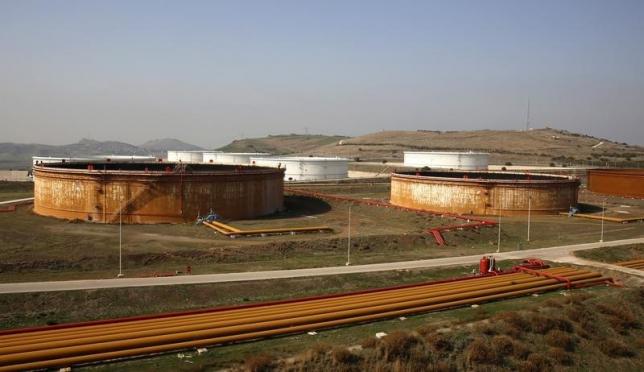
A general view of oil tanks (brown, foreground) at Turkey’s Mediterranean port of Ceyhan, which is run by state-owned Petroleum Pipeline Corporation (BOTAS), some 70 km (43.5 miles) from Adana February 19, 2014. REUTERS/Umit Bektas
Kuwait-The World Bank (WB) supports reform steps that have been taken by Kuwait and view them as utter significance for attaining development objectives, said the WB Office Director in Kuwait, Dr Feras Raad.
In an interview with KUNA, Dr Feras Raad said that the package of measures, declared by Finance Minister Anas Al-Saleh aims to accomplish short and medium-term reforms at the political and financial levels, namely regarding privatization, entrepreneurship, labor market, investment environment and businesses.
Explaining the significance of these plans, Raad said that they are necessary for re-defining the role of the public sector in the national economy and preparing the state and the society for interaction within a new economic environment that is not based on oil in the long run. He also noted that such reforms need to be accomplished quickly to record decline of oil prices.
The Chief of the local WB bureau supported the state plan to rationalize subsidies, for such an approach is compatible with the WB principle, which states that government’s support should be for people who deserve to be backed up rather than commodities and services.
Moreover, subsidies impact negatively the state budget and its financial sustainability in the long term.
Projected Kuwait budget deficit for upcoming fiscal year stands at $40 billion; this is a new burden for the government that can only be tackled through borrowing or withdrawing funds from the general reserves, Raad elaborated.
Explaining further, he said that subsidies contribute to creating “unsound customs
in the society namely encouragement of excessive spending,” adding that support for oil by-products lead to negative impact on the environment due to mounting usage of fuel-powered vehicles.
Furthermore, the WB backs endorsing new economic regulations, added tax value, profit fees, rules on the public tenders and defaulting.
Such legislations, in addition to others on establishing the single gateway for registering companies and upgrading the custom and investment sectors and trimming bureaucracy, will improve the business environment and help in creating new work opportunities particularly in the private sector.
“The (current) public employment policy is actually a mechanism for distributing the oil wealth to the citizens,” Raad said, also expressing his belief that it lured 90 percent of the national labor force to the government sectors.
He called for tackling this defect, urging citizens to work in the private sector and create what he called a new mechanism “to re-distribute the national wealth to the nationals.”
On sectors that can be utilized in the diversification approach, he mentioned the commercial and logistical ones, in addition to light industries, small and medium enterprises, specifically ventures in modern technology, information and communications.
On the other hand, Deputy Prime Minister and Minister of Finance Anas Al-Saleh said that the government will present the draft economic reforms, which consist of six main axes among which are the financial reform, redrawing of the state role in national economy and revitalizing the private sector’s role in economic recovery.
“The reforms also include restoring the economic legislations and institutions, involving the public in funding the projects and reforming the labor market and the civil service system,” he said.
“The document, the fruit of several studies in the past, includes 40 practical programs of action with different time schedules. These include 23 short-term programs, 13 medium-term programs and four short-to-medium term programs,” Al-Saleh pointed out.
